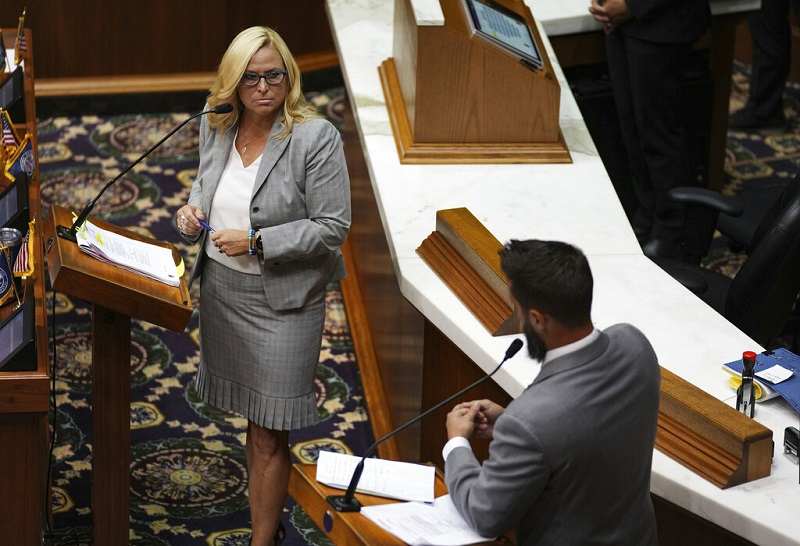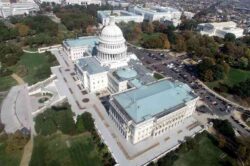Indiana House passes abortion ban, sends to Senate

Republican Rep. Wendy McNamara, left, listens to questions from Republican Rep. Matt Hostettler, right, before a vote is held on Senate Bill 1 during a special session Friday, Aug. 5, 2022, at the Indiana Statehouse in Indianapolis.
10:47 JST, August 6, 2022
INDIANAPOLIS (AP) — The Indiana House on Friday voted for a ban on nearly all abortions in the state, sending the legislation back to the state Senate to confer on House changes.
House members advanced the near-total abortion ban 62-38 with limited exceptions, including in cases of rape and incest, and to protect the life and physical health of the mother.
If the Senate approves the bill as is, Indiana lawmakers will become the first in the nation to pass new legislation restricting access to abortion since the U.S. Supreme Court’s ruling in June that overturned the 1973 landmark Roe v. Wade decision that made the procedure legal nationwide. The measure then would go to Republican Gov. Eric Holcomb, who has not indicated whether he would sign it.
Republican Rep. Wendy McNamara of Evansville, who sponsored the bill, told reporters after the vote that the legislation “makes Indiana one of the most pro-life states in the nation.”
Outside the House chamber, abortion-rights activists often chanted over lawmakers’ remarks, carrying signs like “Roe roe roe your vote” and “Build this wall” between church and state. Some House Democrats wore blazers over pink “Bans Off Our Bodies” T-shirts.
The House version of the ban added exceptions for protecting the health and life of the mother after repeated requests from doctors and others. It also allows abortions if a fetus is diagnosed with a lethal anomaly.
The bill removes Senate-approved time frames based on a patient’s age for abortions in cases of rape or incest. Instead, it creates a blanket ban after 10 weeks post-fertilization on abortions in cases of rape and incest. Victims would not be required to sign a notarized affidavit attesting to an attack.
Friday’s vote came about one week after the Republican-controlled Senate narrowly passed its ban. Senators could consider the House-endorsed abortion ban Friday afternoon, when further changes are possible.
House and Senate legislators listened to hours of testimony over the past two weeks in which residents on all sides of the issue rarely, if ever, supported the legislation. Abortion-rights supporters said the bill goes too far, while anti-abortion activists expressed it doesn’t go far enough.
The House also rejected, largely on party lines, a Democratic proposal to place a non-binding question on the statewide November election ballot: “Shall abortion remain legal in Indiana?”
The proposal came after Kansas voters resoundingly rejected a measure that would have allowed the state’s Republican-controlled Legislature to tighten abortion in the first test of voters’ feelings about the issue since Roe was overturned.
Indiana House Speaker Todd Huston told reporters that if residents are unhappy, they can vote for new lawmakers.
“Ultimately it’s up to the Senate,” he said. “Voters have an opportunity to vote, and if they’re displeased, they’ll have an opportunity both in November and in future years.”
Indiana’s proposed ban also came after the political firestorm over a 10-year-old rape victim who traveled to the state from neighboring Ohio to end her pregnancy. The case gained attention when an Indianapolis doctor said the child came to Indiana because of Ohio’s “fetal heartbeat” ban.
Democratic Rep. Maureen Bauer spoke tearfully before Friday’s vote about people in her South Bend district who oppose the bill — the husbands standing behind their wives, the fathers supporting their daughters — as well as the women “who are demanding that we are seen as equal.”
Bauer’s comments were followed by raucous cheers from protesters in the hallway and subdued applause from fellow Democrats.
“You may not have thought that these women would show up,” Bauer said. “Maybe you thought we wouldn’t be paying attention.”
West Virginia legislators on July 29 passed up the chance to be the first state with a unified ban after its House of Delegates refused to concur with Senate amendments that removed criminal penalties for physicians who perform illegal abortions. Delegates instead asked for a conference committee to consider the details between the bills.
The debates come amid an evolving landscape of abortion politics across the country as Republicans face party divisions and Democrats see a possible election-year boost.
The Indiana House vote further illustrated a deeply divided chamber, which formerly defeated an amendment that would have removed exceptions for rape and incest. Most GOP members wanted their removal, though ultimately most voted for the bill. The House vote and lawmakers’ discussions displayed a similar division seen in the Senate over those same exceptions.
Nine Republicans — including Rep. John Jacob, who had called for removing those exceptions — joined all 29 Democrats in voting against the bill.
“There is forgiveness for the sin of abortion,” Jacob said Friday.
Religion was a persistent theme during the special session, both in residents’ testimony and lawmakers’ comments.
In advocating against the bill, Rep. Ann Vermilion condemned her fellow Republicans calling women who obtained abortions “murderers.”
“I think that the Lord’s promise is for grace and kindness,” she said. “He would not be jumping to condemn these women.”







